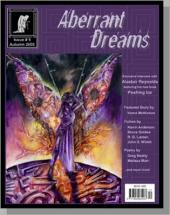
"The Wizard’s Apprentice" by Verna McKinnon
"Halloween Man" by Kevin Anderson
"The Five Phases of Darlene" by Bruce Golden
"Alicia’s Schoolmate" by John S. Walsh
"Little Mickey’s Big Nut" by R. G. Larsen
Issue 5 of Aberrant Dreams contains an eclectic mix of stories. This e-zine may still be trying to define itself as some stories appear to be targeted at a wildly different audience than others.
The featured and first story is "The Wizard’s Apprentice" by Verna McKinnon. Wizard Duncan’s energetic but troublesome niece invades his life. She comes to him on the pretense of being sent by her father to be his apprentice, but she has really run away from a troubled life. When he confronts her with the truth, she runs away again, straight into the arms of a boy who wishes to sacrifice her to a demon god.
The story is simple, the plot predictable, the characters don’t do anything unexpected, and the villain of the story is barely founded and doesn’t inspire tension. Also, "The Wizard’s Apprentice" wields a heavy hand with morals: don’t lie, don’t run away, and face up to your problems. Aside from some clever dialogue, there isn’t much to recommend the story for a reader of wide experience. A younger audience would probably enjoy it if they have a taste for fantasy.
"Halloween Man" by Kevin Anderson is the story of Troy, a teenage boy certain that a childhood horror story has come to life. Troy convinces his friend, Devin, to help him hunt for the Halloween Man—a dark apparition with a jack-o-lantern for a head—who Troy is certain is responsible for the murder of several missing people.
"Halloween Man" takes horror clichés and plays clever games with them. There’s a spooky pumpkin patch, a mysterious figure, and monstrous shadowy animals. Troy is a profoundly stupid star athlete, but also a determined and brave hero. Devin is the smart, physically slight best friend. These story elements combine in a twist ending that is entertaining, if perhaps a bit predictable.
In "The Five Phases of Darlene," Bruce Golden gives us a world of virtualities and purchasable emotions. Dave and Darlene lost their child in an accident. Dave tries to continue with his life, only occasionally resorting to an emotional bump from drugs. Darlene throws herself completely into Phasing, the hardcore use of a variety of emotion-manipulating drugs. At first, Dave is accepting. But as Darlene loses herself more and more to the effects of the drugs, he becomes concerned. A well-written, edgy tale, and the best story of this issue, "The Five Phases of Darlene" is a dark retrospective on the dangers of chemically altering the mind.
Next is John S. Walsh’s "Alicia’s Schoolmate." Told from a child’s perspective, it is about a girl named Alicia. She is at school, although she doesn’t know why. She was sick, and now just wants something to eat. Well, she wants people to eat, but she never gets the chance because the adults always eat before her. Alicia wanders around the school until she finds Elizabeth hiding in a closet and befriends her.
Alicia is, of course, a zombie a la Shaun of the Dead/28 Days Later. She retains some personal cognizance after she becomes infected, unlike the adults surrounding her. However, the story ends with a chilling observation on adulthood that can easily be paralleled in our own society. A wickedly dark ending in an already dark story makes "Alicia’s Schoolmate" truly enjoyable.
The final story of this issue is "Little Mickey’s Big Nut" by R. G. Larsen. Little Mickey is a small-time hood with a tendency to irritate the wrong people. Julie is a prostitute with a penchant for vengeance. When Little Mickey slips some funny money to Julie in payment for services rendered and stiffs her favorite bartender in the same way, Julie decides to get even. As mob stories go, this is pretty standard fare. It’s entirely out of character with the rest of the issue and is lacking a speculative element.
This issue of Aberrant Dreams had two very good stories and a couple decent ones. For future issues, I hope the editors will avoid tales that aren’t speculative if they wish to establish a reputation as a speculative fiction magazine. I also hope they will develop a more printer-friendly layout as this reader had trouble reading the offerings onscreen.